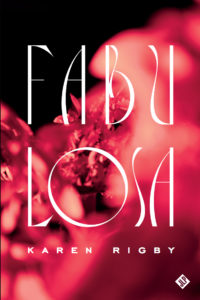 Review by Sharon Tracey
Review by Sharon Tracey
Fabulosa—the second poetry collection by Karen Rigby—lives up to its title, propelled by a sensory rush of cinematic color as the poet pulls us through poems as vivid as paintings, as physical as putting on a dress or taking a breath. And a poetry collection that opens with “Why My Poems Arrive Wearing Black Gloves” has my attention from the get-go. Rigby lets us know that they’ll be arriving “wearing satin or suede to haunt you when they leave / no trace” (1). She also cleverly inserts small clues in the first poem that become signposts for the book’s three sections—”Noir & Glitz,” “Wolf Behind the Saint,” and “In the Director’s Cut.” Rigby’s poem titles also come with their own satisfactions, many so bold and surprising, that strung together they could make their own lovely found poem.
Cultural icons mark the book like posts on a two-lane highway. There’s a sense of speed but still slow enough to read the signs. There’s Johnny Weir at the Winter Olympics with his blades and clockwise spins, Marion Cotillard at the Oscars. There’s public performance and the more personal as the reader delves deeper into the collection and more glimpses of the poet emerge, reflecting past struggles, grief, and beauty within poems that sometimes seem larger than life. It’s as if the larger “fabulous” world-making allows the poet to speak what might be otherwise unsayable.
Underneath the flash of fashion, cinematic scope and sensory tones, there’s an underlying urgency and vulnerability, as Rigby writes, “Whatever we love is already leaving. / Whatever we touch, dissolves.” (8). In “Not the Ghost of a Rose,” we see the distance between the poet as a girl in her home country and her adult self in Arizona: “not the icy sidewalk / half a world from home, / but petals orange / and blue as butane, / blossoms scented with violence.” (27)
Rigby has a keen eye for observation and a touch for creating light as if through a prism to find deeper meaning. Take these lines from “The Roses” (12):
Phosphorus stuck in midnight air.
Flame cupped against the rain.
Deadheaded rose, crowned with bees.
Daily the cut arrangement
threaded in chain link, yellow tape
dividing yesterday’s gunfire
From today’s erasure.
The roses are edged with bruises.
And the opening lines of “Why My Poems Refuse Daylight” (39):
Pinpricks on water,
celluloid glare too paradisical on the retina. It’s not
natural for my poems to roll up
on a butter-gold vista
& idle without a single cumulus. There’s got to be a violin:
tension like a knife-thrower
weighing its target the split-
second before it hits
clear above the eyes. What’s there to contemplate
if everything’s explainable? …
Sometimes it seems understanding is beside the point—what’s more important being the feeling poems elicit. Poems that end in fire, refuse daylight, speed jump rope. Poems that make declarative statements as if the poem itself is alive and will tell us why. Furred bees that buzz and weave through lines and reappear later on. It’s an energetic and inventive twist that draws the reader into a vortex of vitality. There’s also the sense of synesthesia—at one point I counted twenty-four different ways to describe color, the hues imbuing the poems along with the scents of lemon and mottled plums. So come to a poetry party as colorful as a Venetian ball or a Mardi Gras parade. Then stay for the reflections inside the eye of a hurricane.
In the heart of the collection, there’s a small poem titled “Horoscope: Earth Horse” (38) which seems to aptly concentrate and connect the threads of the poet’s journey and intention. It holds both action and its weight, then ends on a note of hope:
Lift the kettle. Allow each ghost to sing.
Hang a blouse in a southern wind.
Carry the mountain, but don’t speak.
Don’t break the ampoule with your teeth.
Face mysteries with their spines in.
This year, take the arrow and live.
Fabulosa by Karen Rigby
JackLeg Press, 2024, $18.00 [paperback]
ISBN: 9781956907094
Sharon Tracey is a poet and editor and the author of three books of poetry: Land Marks (Shanti Arts 2022), Chroma: Five Centuries of Women Artists (Shanti Arts 2020), and What I Remember Most is Everything (All Caps Publishing). Her work has appeared in Radar Poetry, Terrain.org, Lily Poetry Review, The Ekphrastic Review, and elsewhere. She previously served as a director of research communications and environmental initiatives at the University of Massachusetts Amherst.
